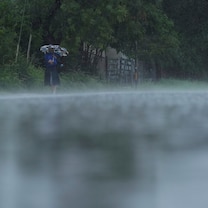'Everything Is Gone, We Have Nothing'
Five weeks after Cyclone Nargis struck Myanmar, ABC talks to those affected.
YANGON, Myanmar, June 9, 2008 — -- The following dispatch was written for ABC News by a journalist who has been inside Myanmar. Out of concern for the reporter's safety, we are not revealing the author's name.
Downed trees line the streets, their massive roots shooting into the air and their trunks blocking traffic. Repair crews trim large branches that have fallen into the streets. Piles of refuse sit untouched in front of dilapidated commercial buildings. And the city's proud pagodas show damage from the storm, their golden spires bent toward the earth, snapped in half by powerful winds.
Indeed, the deadly effects of cyclone Nargis, which tore through Myanmar more than a month ago, are clearly on display here in Yangon, the country's largest city. More than 134,000 people are estimated to have died in Myanmar, also known as Burma, and more than a million survivors remain, many of whom still lack proper food, water and shelter.
Foreign journalists are prohibited from entering this repressive country, which is ruled by a hardline military regime. But I'm posing as a tourist, reporting surreptitiously on the state of the country in the wake of the world's worst natural disaster since the 2004 Asian tsunami.
But unlike the tsunami, when the world saw the damage thanks to open media coverage -- and when governments throughout the region allowed relief groups to provide aid unfettered -- Myanmar's junta has allowed only limited access to the hardest-hit areas. Some say the government is blocking aid outright -- or simply confiscating it.
The isolated leadership, fearful and paranoid of outside influences, has been reluctant to allow access. That's why today, more than a month after the disaster, people here -- people who had little to begin with -- now have nothing at all.
I've made my way to the outskirts of Yangon, to a region in the northeast called Dagon Myothit. As my taxi driver and I bounce along the rutted road in his ancient sedan, I begin to see lines of wooden shacks that were pummeled by Nargis.
Some dwellings lack roofs altogether. Others have walls that have crumbled under the weight of the storm. Some houses are flooded and muddy water laps through the single-room dwellings.





